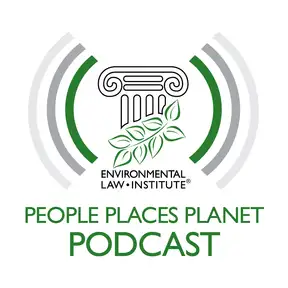All Episodes
Displaying 1 - 20 of 195 in total
Centering Equity in Ocean Governance
What does equity look like in ocean governance? In this episode of People, Places, Planet, host Sebastian Duque Rios speaks with Yoshitaka Ota of Ocean Nexus and Randa...

A New Era? Private Sector Leadership in Environmental Law
Is environmental law entering a new era—one defined not just by regulation and litigation, but also by implementation, incentives, and private-public partnerships?In t...

Data Centers, AI, and the Grid: Can Load Flexibility Unlock New Capacity?
As artificial intelligence drives unprecedented growth in electricity demand, data centers are rapidly becoming some of the largest—and most consequential—loads on the...

FIFRA, Explained
From the food we eat to the parks, farms, and neighborhoods around us, pesticide policy quietly shapes everyday life in the United States.In this installment of our Ex...

What’s Next for Environmental Law in 2026
As 2025 comes to a close, People, Places, Planet takes stock of a year of profound change in environmental law—and looks ahead to the legal and policy questions that w...

Defensores ambientales: hacia la rendición de cuentas en Colombia
This is a special edition episode in Spanish with our Colombian partner on ELI's Environmental Defenders Database project. If you'd like to learn more, please visit ou...

Groundtruth: Sustaining State Environmental Justice Programs in a Changed Policy Environment
Environmental justice continues to evolve as states respond to shifting federal priorities and community needs. New Jersey has emerged as a leader, integrating equity ...

ESA, Explained
At a time when species across the country face mounting pressures, the Endangered Species Act remains one of the most powerful—and contested—tools we have to protect t...

Fish, Conflict, and the Future of Our Oceans
As climate change reshapes our oceans, fish populations are shifting across borders and into new territories, creating ripple effects for food security, livelihoods, a...

Inside NYC's Congestion Pricing Program
As the first U.S city to implement a congestion pricing program, New York City has begun charging vehicles entering high-traffic areas of Manhattan a toll. With this i...

Indigenous Approaches to International Law
What does it mean to “indigenize” international law—and why does it matter for the environment? In this episode of People, Places, Planet, host Sebastian Duque Rios sp...

NFMA, Explained
What is the National Forest Management Act (NFMA), and how has it shaped the way America manages its forests? In this episode of People, Places, Planet, host Sebastian...

A Thriving Future for Wetlands: Lessons from Louisiana, Virginia, and Idaho
Since 1989, the National Wetlands Awards have honored leaders who protect, restore, and steward America’s wetlands. In this episode of People, Places, Planet, host Seb...

Celebrating Collaboration: ECOS and the Future of State-Level Environmental Policy
In this special episode of People Places Planet, host Sebastian Duque Rios speaks with Ben Grumbles, president of the Environmental Council of the States (ECOS), and s...

Packaged with Care: Plastic Packaging, EPR, and the Circular Economy
Plastic packaging is everywhere—from grocery store shelves to e-commerce deliveries—and it’s one of the largest contributors to global plastic waste. In this episode o...

Finding Common Language: Communicating about Environmental Law
Environmental law is complex, technical, and often inaccessible to the very people it’s meant to protect. In this special episode of People, Places, Planet, host Dara ...

CERCLA, Explained
What is CERCLA, and why does it matter for environmental law and justice? In this episode of People, Places, Planet, host Dara Albrecht sits down with environmental la...

Rethinking Environmental Governance: Reflections from Adapting to High Level Warming
If you're interested in purchasing Adapting to High Level Warming: Law, Governance, and Equity, please visit ELI's website for more information.What happens when clima...

Wading into a Warmer Future: Developing Climate Resilient Wetlands
Wetlands play a critical role in protecting communities from climate change, but restoring and sustaining them in a shifting climate is no easy task. In this episode o...

Leveraging Corporate-Community Agreements for Environmental Justice: An ELPAR Article Spotlight
In this special ELPAR edition of People, Places, Planet, host Dara Albrecht is joined by guest co-hosts Linda Breggin and Mara Pusic to explore one of this year’s top ...

